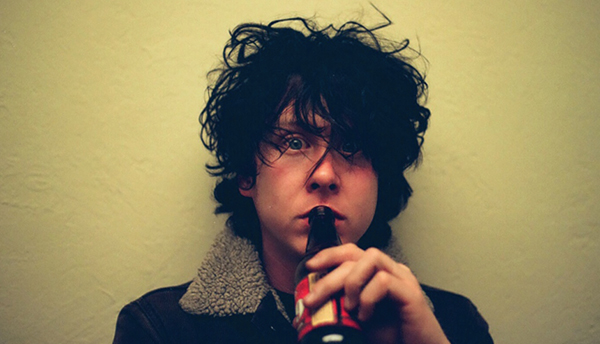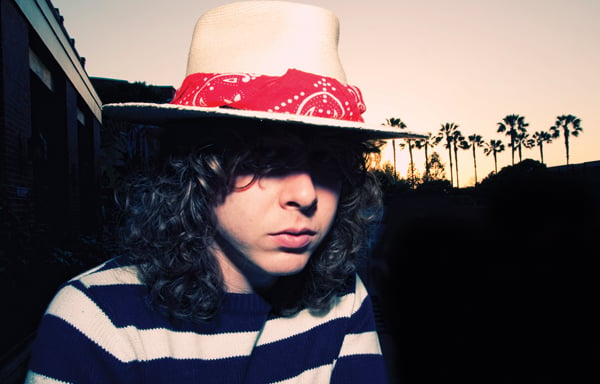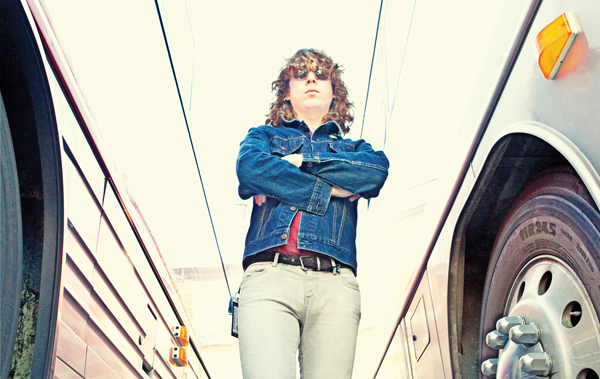Ben Kweller is the real deal. Authentic. You probably already know all about the “indie darling” legend. This piece is not about Ben’s music, which is fantastic. It’s about the process that has allowed him to do it for 20 years (and counting). It’s also about a musician taking control of his artistic and business future with the intention of doing great work, purely from the soul. That’s what we all really want, isn’t it?
 Ben is one of us, and more. He’s been there, done that. He’s played to only a bartender and his girlfriend, and he’s also toured the world many times. He’s been signed as a teen, gone solo before he could buy a drink, became an indie star before it was cool, did Brooklyn before it was cool, got signed again, had music in movies, got dropped from a label, built a studio, produced other artists, and is now acting in movies – all while maintaining a relationship that now includes two children. Seriously, no matter where you are in your career, he’s been there, and knows the struggle you are going through as an artist making their way through this business – because he still is, too.
Ben is one of us, and more. He’s been there, done that. He’s played to only a bartender and his girlfriend, and he’s also toured the world many times. He’s been signed as a teen, gone solo before he could buy a drink, became an indie star before it was cool, did Brooklyn before it was cool, got signed again, had music in movies, got dropped from a label, built a studio, produced other artists, and is now acting in movies – all while maintaining a relationship that now includes two children. Seriously, no matter where you are in your career, he’s been there, and knows the struggle you are going through as an artist making their way through this business – because he still is, too.
And now, add to his resume: Music Mogul. Ben Kweller has fully launched his very own label, The Noise Company. He tapped fellow Austinite, Kevin Wommack (Playing in Traffic Records) to run the label, and expanded the staff to include the terrific Emmy Black (formerly of Bar None Records) and Mary Jurey (formerly of New West Records). This is no vanity label though; with distribution through Warner’s Alternative Distribution Alliance (ADA) and an eye for publishing revenue, they are ready for success. In addition to Ben’s latest release, Go Fly A Kite, the label recently signed indie band Wild Child, which recently won two Austin Music Awards. Wild Child’s first release for the label, The Runaround, is out now and was produced by Kweller.
I had a chance to chat with Ben over a few days about the new label, life off the road, artistry in general, and what advice he would give to artists in the game today. We laughed a lot, and even sang some Hall and Oates together! He provides some great insight into what’s working…
So, you’re off the road, in Austin with the family now; how’s life going?
Great, we’re getting the kids back into school, and there’s swimming lessons going on. Weekends are like holidays! It’s really a cool time.
But, as always, you are actually really busy, right? Fully launching the label, adding management. Plus: signing, producing, and now releasing the Wild Child’s new release. That’s a lot. How is the transition going?
It’s a really cool and exciting time for me. For the last five years, I’ve been managing my own affairs: publicity, booking, tour planning, catering, etc. Ha! It’s been a great experience and education. I’ve met a bunch of cool people and built a ton of personal relationships. But there’s a lot I want to do. I want to see The Noise Company grow, and I wanted to produce more. I like being creative, but I can’t run a record label AND produce, and record, play shows, and whatever else. I want a record label, but I don’t want to run it. I shouldn’t.
Enter Kevin Wommack (new head of The Noise Company and manager). It seems like he is the glue that is going to hold this all together.
Yeah, Kevin is the man. He was just the right fit. He’s been around longer than I have and gets it. To trust my career and business to someone is a big deal. There’s something about working with people who have toured and are songwriters, like Kevin. You know that they know, without having to go into why. That’s cool.
 Why start your own and not just take a new deal with an established label?
Why start your own and not just take a new deal with an established label?
In 2013, every musician is the C.E.O. of his or her own career. You can’t just be a slacker artist anymore. The bands coming up in the ’90s were the last generation to not care about ‘points’ or publishing, and just let it be ‘taken care of.’ There’s not as much money to go around these days, so you can’t rely on a bunch of people to do everything for you, but you do need a team. That’s what we’re trying to do with The Noise Company.
You’re producing a lot more; will that continue with acts that your label signs?
This (The Runaround) is my fourth. I have to say that Roger Greenwald, my first producer, taught me everything I know about the art of recording and production. I am so lucky to have worked with him. Of course, as a label, I have that romantic idea of a Berry Gordy operation – obviously that’s the shit! But I am busy as an artist, too, and that’s got to be the priority. When it comes up and the stars align, I will put everything on hold for the right one, but my fans are the priority.
How did working with Wild Child come about?
Candice Digby is really the one responsible for us working together. She turned me on to their first self-released record. I liked it and then I saw them live, and loved it. Then they started sending me demos and the songs were almost done. I pushed them to change a little here and there, and we just decided to do the full producing thing. I’m a diplomatic producer. It sucks if a producer walks in and says, ‘This chorus sucks, go rewrite it!’ It’s their album and they have to live with it. Make music you believe in, and don’t give a fuck what others think about it. They seemed to agree with that.
Sounds like it was a good match. How was it different than recording and producing yourself?
It was special because not every album has a definite first single, and ‘Crazy Bird’ is the first single on this record. Hands-down, everybody knows it. That is totally different than my records.
How should independent bands approach live shows now?
I am still a true believer in one fan at a time; but there’s a trick to it. I don’t recommend just touring for touring’s sake. I think even better results come from opening for people as much as possible to get in front of their fans. When I was in NYC and went solo, I made Freak Out, It’s Ben Kweller. I got pretty lucky because Jeff Tweedy, Juliana Hatfield, and others heard it. I didn’t headline for two years. I just kept opening up for people and tried to win their fans over. Once you’re in, become friends with booker at the venue. Also, have a mailing list, it is still so important.

What do you think about musicians on social media?
Again, it’s all about authenticity. I have good friends, like Conor Oberst, and he doesn’t do Twitter or Facebook at all; he won’t touch the stuff. And that’s cool. And then there are some people that tweet about everything like John Mayer used to. Both are fine as long as you are being yourself. I talk about politics sometimes. There’s a time and place for everything, but if you believe in it, share it – even if it’s cookies you made, you know? Part of being an artist is how you perceive the world around you.
Are you on the YouTube bandwagon? Have you seen that songs with videos do better at shows, or on radio?
Yes, I love video. I think everyone loves video. I’ve always loved home movies. YouTube is fun as hell. As far as reactions, there are certain videos that really stick with the fans. I have a song called ‘Fight’ – in the video the kids are pumping their fist to the beat, and now the kids do that to the song when I’m playing it live. That’s pretty cool. I even know it’s coming, so I can kind of control how they respond.
Is radio dead? Should bands focus on streamers like Spotify etc., or does a traditional college radio campaign still make sense?
Definitely get on all the digital stuff you can. You do still have to spend a bunch of money to get in front of program directors. That’s just the deal. But, I am also still a big believer in radio. I never had a ton of it, but enough of it to see it can make a big difference over time. It can still be a place for the more alternative, ‘left of center’ stuff. It’s also about priorities. If I only had $2,000, I’d bypass the radio stuff, print some t-shirts for fans and make sure to have van that’s ready to go. Live performances are the quickest way to get your music to people. It’s amazing how radio follows that.
So now as a big label ‘suit…’ (Ha! Ha!) How does a band get your attention? Should they do a demo, wait until they can finish a recording to license, or just send a live video?
Every step of the way that you move closer to a finished product is a good thing. I like more of a collaborative A&R approach. Wild Child did a self-released thing, and they developed a great following here in town [Austin]. Then they played me some demos of new songs, and I knew I wanted to help produce. It’s a process. What’s the vision? Do people dig it? Can I see where it can go? As a producer, I love a demo so I can have input on the final output. But a finished release is cool, too. The best way to get my attention is to make compelling art, and always have new stuff being worked on. We’re always looking, and if a record comes along that we love, we’ll get into it. We get submissions from fans and we have music meetings and listen to stuff. I’m looking for people where music is your only option in life. If that’s the case, you are probably already building a following, writing, and recording. Those are the people I want to hear.
In other words, “authentic.”
Damn right.
Hit them up if you got the goods, at thenoisecompany.com.
ABOUT THE AUTHOR
-Michael St. James is the founder and creative director of St. James Media, specializing in music licensing, publishing, production and artist development.
